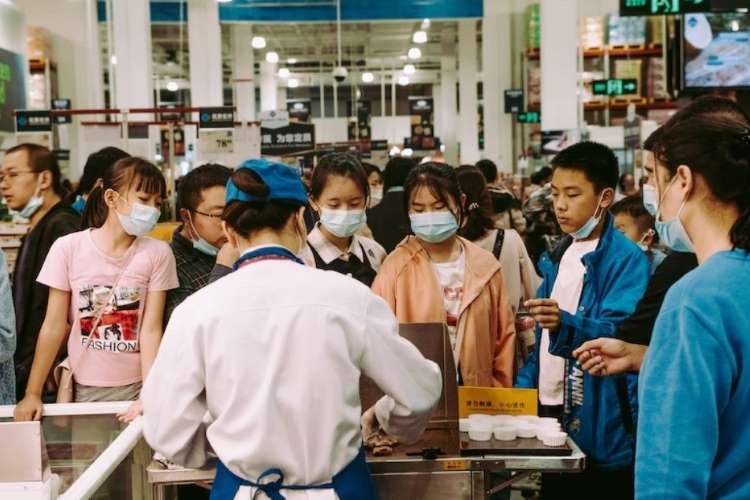China’s zero COVID policy: There was no plausible explanation from the Chinese Communist Party leadership for its zero covid policy that pushed the global economy into a crisis. Its withdrawal after the 20th Congress of the CCP was widely anticipated, but even the bitterest critics of the Chinese leadership would have expected the lack of preparedness and the absence of a coherent strategy. The new outbreak threatens the world which is already facing a full-blown recession and sticky inflation.
On December 7, the Chinese government withdrew the draconian measures put in place during the early days of coronavirus outbreak in 2020, The steps including lockdowns, tests and quarantines were lifted without proper guidance from the public health authorities. Chinese capital Beijing is experiencing a spurt in omicron infections that threaten to sweep the world’s most populous country. The scared citizens are indulging in panic buying of food and medicines. The abrupt deactivation of the Covid tracking app also meant lack of quality data on infections.
READ | Greenland’s glaciers are melting 100 times faster than estimates
Age profile of Chinese population
One of the reasons for the prolonged zero covid policy is said to be China’s ageing population that is vulnerable to infections. (See graph) The coverage of Covid vaccine booster shots is extremely low (40%) among people above 80 years. The booster coverage is just around 69% for population above 60 years. Furthermore, vaccines developed by other nations were unavailable in China. President Xi’s insistence on self-reliance in fighting Covid kept the foreign vaccines away from Chinese shores. Dr Anthony Fauci, Chief Medical Advisor to the President of the United States, recently said that China’s problems stem from its refusal to approve effective foreign-made vaccines.
As reports of a large number of deaths pouring in, several estimates forecast more than one million deaths in the new year. The government initiatives to step up vaccination of the elderly may have come a bit late. And the country is expected to underreport deaths like other emerging market economies. Like several other nations, China also erred in not acknowledging that it has failed to tackle the pandemic crisis. The Chinese government may never admit that it went overboard with the lockdowns. By switching from one extreme position to another, China may have prolonged the crisis.
China: New covid cases and death toll
The spurt of omicron infections will be seen as a personal failure of Xi Jinping who secured a third term as the CCP General Secretary till the 21st Congress of the party in 2027. Xi had made the war on Covid 19 a personal battle. Epidemiologists expect at least three waves of the coronavirus infections to hit China during winter. If the infection results in a large number of deaths, Xi and the communist party will have a lot of explaining to do on a total lack of preparedness by the country’s massive public health infrastructure.
Why did the zero covid policy fail
The government was also underprepared for the spread of the virus in rural areas as adequate number of vaccine doses were not available. As per news reports, China’s own vaccines were not as effective as the western ones. China also suffered from the heavy-handed authoritarianism of its government and the tendency of citizens to blindly obey the authority. President Xi staked his reputation on the zero covid policy and stuck with it long. When the restrictions were suddenly lifted, a large number of Covid deaths were bound to happen.
READ | Indian education: Low employability of students, lack of quality jobs feed each other
The policy was introduced to curb coronavirus infections at a time when other nations were opening up their economies with minimal control. China locked itself down at the cost of citizens who struggled to get access to medical care and ration supplies. The government continued with mass testing, quarantines and lockdowns even as citizens scrambled to make ends meet. The lockdowns spelt doom for the country’s robust economy.
What does the fresh covid 19 outbreak in China mean to the rest of the world?
The biggest threat is the possibility of newer variants emerging from China. The abrupt scrapping of the zero covid policy by prompted by the plan to revive the sagging Chinese economy. Also, there were widespread protests by workers. But the spurt in infections is likely to defeat this purpose and negate the benefits from the opening up of the manufacturing industry. The lockdowns that led to fall in China’s manufacturing output is blamed for the sticky inflation across the world.
The impact of the Chinese crisis will be far and wide with countries such as the United States feeling the heat. The US relies heavily on Chinese imports and any crisis in China could further fuel inflation, which is persisting at highest levels in several decades. US officials have begun to worry about supply chain disruptions that could hit the nascent economic recovery amid a sharp slowdown in Europe, another important trading partner.

